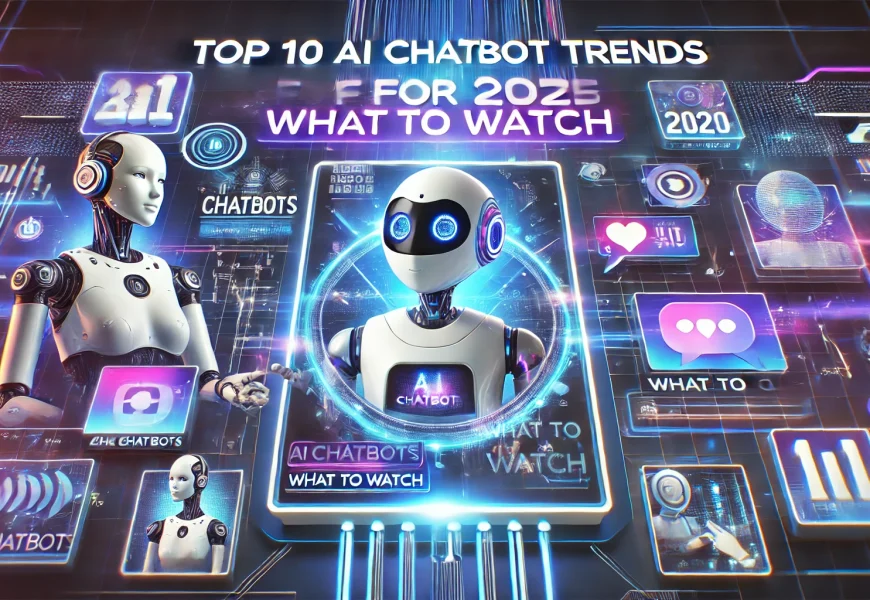Artificial Intelligence (AI) chatbots have transformed various industries, revolutionizing customer interactions and streamlining business processes. As we approach 2025, the rapid evolution of chatbot technology shows no signs of slowing down. Staying ahead of the curve is crucial for businesses looking to leverage these powerful tools effectively.
In this article, we’ll explore the top 10 AI chatbot trends to watch in 2025, offering insights into the exciting advancements that promise to reshape the landscape of human-computer interaction.
1. The Rise of Human-Like Interactions
One of the most significant trends in AI chatbot technology is the development of increasingly human-like interactions. Advancements in Natural Language Processing (NLP) and machine learning are enabling chatbots to understand context, nuances, and emotions in user conversations with unprecedented accuracy.
Key points:
- Improved NLP allows for more natural and engaging conversations
- Sentiment analysis helps chatbots understand user emotions and tailor responses accordingly
- OpenAI’s advanced voice mode for ChatGPT demonstrates near-human-like conversation capabilities
- Google’s Gemini replacing “Hey Google” showcases integration into everyday devices
2. Enhanced Personalization Through AI
AI and deep learning algorithms are revolutionizing how chatbots personalize user interactions. Chatbots can offer tailored experiences, personalized recommendations, and proactive customer support by analyzing vast amounts of user data.
Key points:
- Deep learning analyzes user data to understand preferences and behaviors
- Chatbots can offer personalized product recommendations and services
- Proactive customer support anticipates user needs and offers solutions before they are requested
3. Integration of Voice Technology
The integration of voice technology into AI chatbots is becoming increasingly prevalent, offering hands-free convenience and improved accessibility for users.
Key points:
- Voice-activated chatbots offer hands-free convenience
- Improved voice recognition technology enables more accurate and natural interactions
- Voice chatbots improve accessibility for users with disabilities or in situations where typing is difficult
4. Broader Industry Applications
AI chatbots are expanding their reach across various industries, revolutionizing sectors such as healthcare, finance, retail, and education.
Key points:
- Healthcare: Chatbots are being used for appointment scheduling, telemedicine, and patient engagement
- Finance: Financial institutions are using chatbots for customer service, fraud detection, and personalized financial advice
- Retail: Chatbots enhance the shopping experience by providing product recommendations, customer support, and personalized offers
- Education: AI-powered education platforms use chatbots for personalized learning and student support
5. Chatbots Driving Sales and Marketing
AI chatbots are becoming powerful tools for improving sales conversion rates, personalizing marketing campaigns, and enhancing customer engagement.
Key points:
- Chatbots provide immediate assistance and answer customer questions, leading to higher conversion rates
- AI chatbots can personalize marketing messages and offers based on user data
- Chatbots can be integrated into omnichannel marketing strategies for a seamless customer experience
6. Addressing Customer Expectations
Meeting customer expectations for speed, efficiency, and personalized service is crucial in the age of AI chatbots.
Key points:
Customers expect quick responses and efficient problem-solving from chatbots
Younger generations prefer interacting with businesses through digital channels like chatbots
ersonalized service is essential for building customer loyalty
7. Autonomous AI Agents
The emergence of autonomous AI agents capable of performing complex tasks and making decisions independently is a trend to watch closely.
Key points:
- AI agents can automate complex business processes and make decisions without human intervention
- This trend raises questions about AI oversight and accountability
- AI agents could be the next evolution of AI “copilots”
8. AI and the Post-Truth World
As AI technology advances, the challenges of misinformation and deepfakes generated by AI become more pressing.
Key points:
- AI-generated deepfakes and fake content pose a significant threat to trust and credibility
- Legislation and regulation are crucial for combating the spread of misinformation
- AI can also be used to detect and flag fake content
9. Integration with Augmented and Virtual Reality (AR/VR)
The integration of AR and VR with AI chatbots will redefine interactive experiences by immersing users in virtual environments where they can “meet” their chatbots. By 2025, VR-powered AI companions will allow users to engage in activities like virtual dinners, gaming, or exploring virtual worlds together.
For instance, AI girlfriend platforms may evolve into VR-integrated avatars capable of facial expressions, body language, and interactive storytelling, creating a lifelike relationship experience.
10. Quantum AI’s Potential
The potential of quantum computing to revolutionize AI is an exciting trend to watch in the coming years.
Key points:
- Quantum computing could significantly increase the speed and power of AI algorithms
- Quantum AI could open up new possibilities in fields like medicine, materials science, and energy









